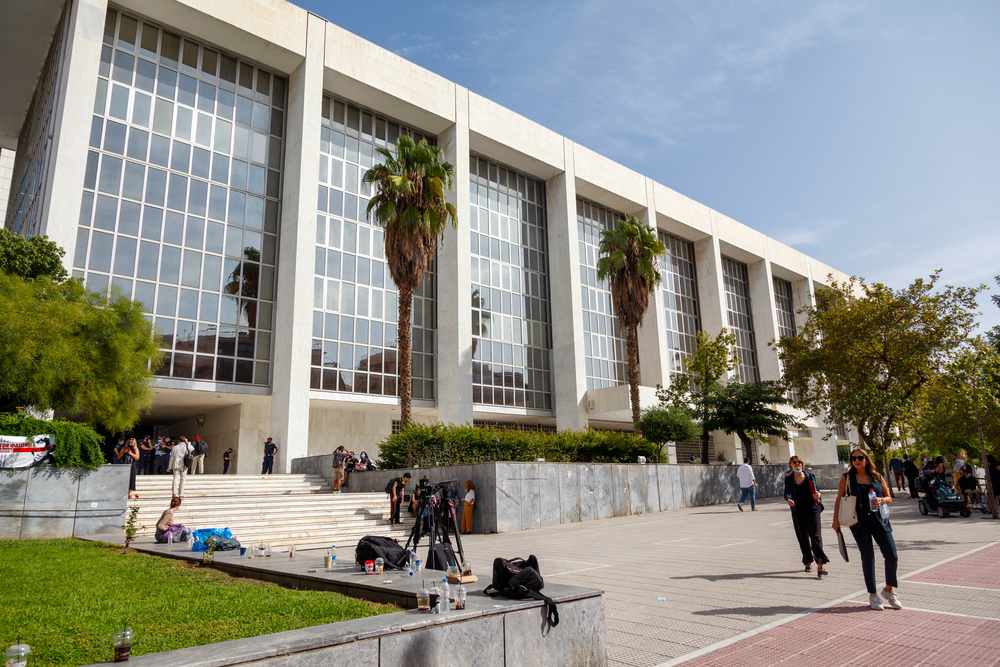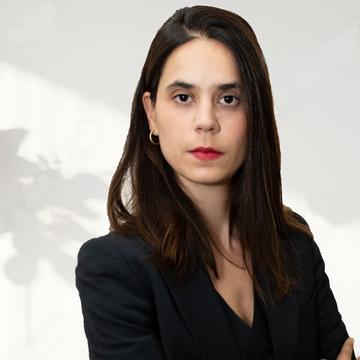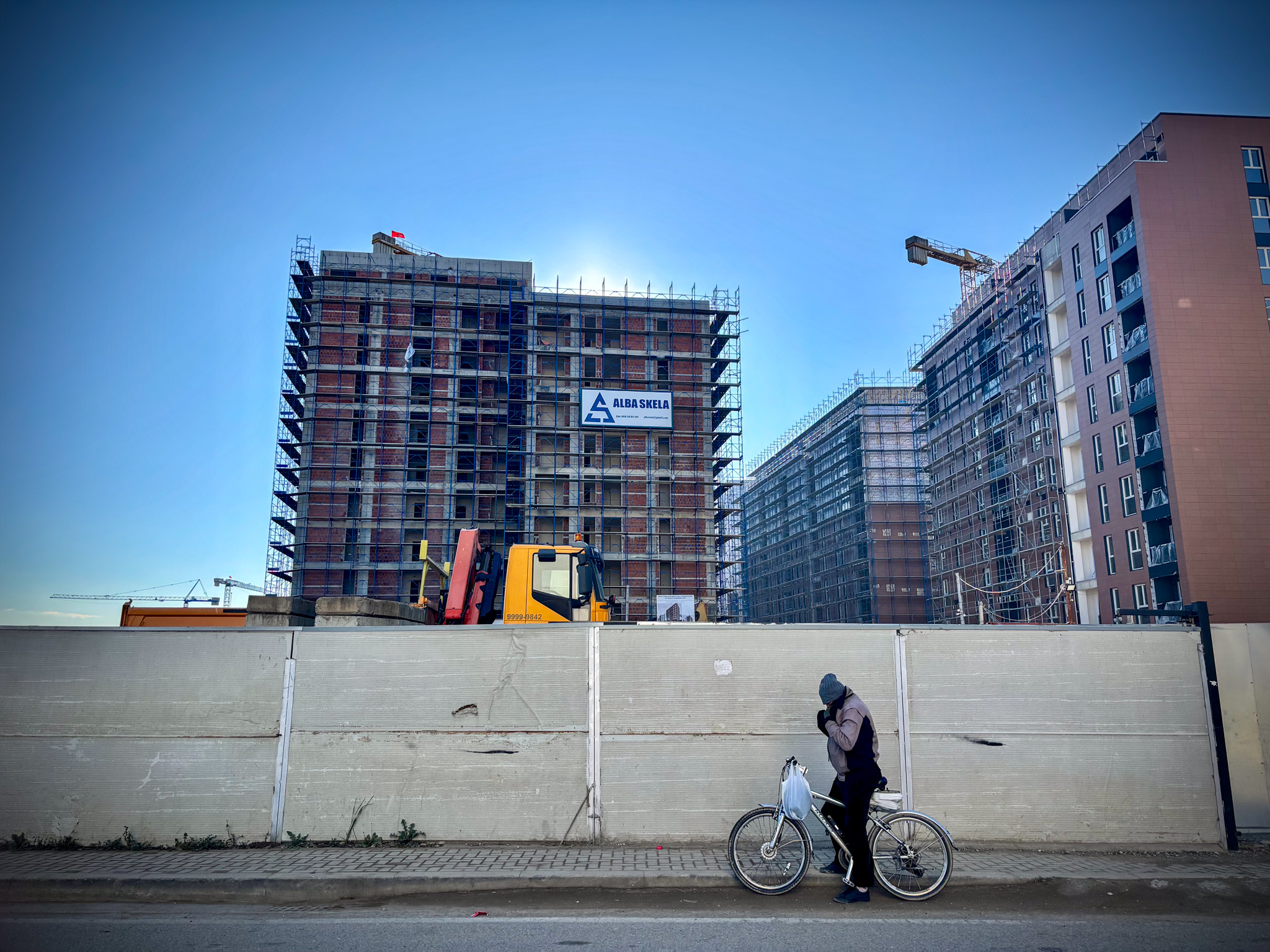Surveillance: how the Greek legal system threatens press freedom
As part of the surveillance series, we interviewed Evita Papakiriakidou, criminal lawyer from the Athens Lawyers law firm, who represents Thanasis Koukakis, a Greek journalist who was the illegitimate target of spyware surveillance

Surveillance-how-the-Greek-legal-system-threatens-press-freedom
The Court of Appeal in Athens, Greece © yiannisscheidt/Shutterstock
Greek journalist Thanasis Koukakis has been a target of both surveillance and an intimidation lawsuit (SLAPP). Could you briefly present his case and the actions you have taken as his legal representatives?
Koukakis was a target of the Predator spyware back in 2020. When he found out, we started taking a series of legal steps. We filed a criminal lawsuit in Athens against those who were behind the use of the Predator spyware, which was unlawful according to Greek and European law. And we have turned to the European Court of Human Rights too.
We are also representing Koukakis in the SLAPP case filed against him by Grigoris Dimitriadis, the former secretary of Prime Minister Kyriakos Mitsotakis, for an investigation published by Reporters United. Mr. Koukakis did not even contribute to the investigation; he simply shared it on Twitter.
Surveillance and intimidation do not concern Koukakis alone. Do you think that the Greek legal framework is equipped to safeguard press freedom and the safety of journalists?
Overall, the Greek legal framework is equipped, even though there are more things to do. The Criminal Code includes provisions that protect journalists and their work. So, the laws are there in most cases; the problem is that they are not always well applied, and that everything takes a long time. If you receive an intimidation lawsuit, it takes several years to get a final court decision. And only once you have tried all internal legal remedies, you can turn to the European Court of Human Rights. This is why SLAPPs happen: to exhaust a journalist’s energy and economic resources.
If the European Court of Human Rights is only a last resort, how come Mr. Koukakis’ surveillance has been brought there already?
Mr. Koukakis’ case was different because the law in Greece was very poor on that specific matter; it was the law itself that we wanted to change. Mr. Koukakis had been targeted with Predator, and in Greece, he didn’t have any legal way to even find out if this was true. This is why we turned directly to the European Court of Human Rights and said that the Greek law itself was against the Constitution.
The EU is currently shaping a new European Media Freedom Act , and the possibility of allowing the surveillance of journalists in cases of “national security” has not been completely ruled out yet. Is the protection of journalists a Greek or a European problem?
When we were preparing Koukakis’ case, we did some research on the legal systems across all EU countries. The Greek system was the most problematic one because you didn’t have any right to be informed – the law has changed now, and I think it was because of our intervention. But before, you could never find out if you had been put under surveillance, not even after the surveillance had ceased. And this is a constitutional right. The main issue with every legal system, including in Greece, but also in France, in Italy, in Germany and so on, is that the notion of “national security” is very vague. It’s up to the states to decide what qualifies as national security.
Koukakis’ case is part of the “Greek Watergate”, a widespread state surveillance system that has been exposed by independent media. Yet the government keeps denying involvement. Do you think a shared truth will emerge in court?
In the criminal lawsuit we filed in Athens, we asked the prosecutor to look into the whole surveillance system. What people and enterprises hide behind Predator? We are determined to get to the bottom of this story. However things are really difficult. The prosecutor also has limited financial and technical means, and not enough staff to investigate everything that has been going on. My hopes arise from the European Court because it’s more independent and goes deep in the essence of the problem dealing with the law itself.
From a legal perspective, do you think that things are getting worse for Greek journalists compared to the past?
Absolutely. Greece ranked lowest among EU countries in terms of press freedom because of the surveillance scandal, the many SLAPPS that are taking place, and of course the killing of a journalist back in 2021. Greece is a small country, it’s not normal that so many incidents are happening. And there are other issues too, such as the criminalisation of NGOs that are working with refugees. So, there are many things happening right now that are pretty dangerous.
The media in Greece never recovered from the economic crisis, and legal cases are expensive in terms of both time and money. Mr. Koukakis is at least a well-established journalist, but what happens if you don’t have the resources to defend yourself?
The situation is particularly difficult for smaller media organisations. They can face huge risks if they publish content that powerful people do not like. The state provides legal support in case a citizen does not have the money to secure legal assistance. But it only applies to those who are in very dire financial conditions, and even then, the legal assistance isn’t always of the highest quality.
How important is independent journalism in Greece?
Greece has just been through a very troubled summer. Very recently, there have been devastating floods in the region of Thessaly, villages have been destroyed and people have drowned. Earlier there were huge fires in Evros; people died there too, and vast forest areas were burnt. Such events show the need for independent journalism. It’s very important for us, for people who do not want to follow the mainstream media, TV channels in particular but also newspapers, because everyone knows they are not independent. There are many great independent journalists. For them to feel strength and continue doing their job, they need to feel safe. This is where the legal framework comes in. They need to have the legal means to to fight all threats. And the financial means, too.
| This publication was produced within the Media Freedom Rapid Response (MFRR), co-funded by the European Commission. The contents of this publication are the sole responsibility of Osservatorio Balcani Caucaso Transeuropa and its partners and can in no way be taken to reflect the views of the European Union. |
Surveillance: how the Greek legal system threatens press freedom
As part of the surveillance series, we interviewed Evita Papakiriakidou, criminal lawyer from the Athens Lawyers law firm, who represents Thanasis Koukakis, a Greek journalist who was the illegitimate target of spyware surveillance

Surveillance-how-the-Greek-legal-system-threatens-press-freedom
The Court of Appeal in Athens, Greece © yiannisscheidt/Shutterstock
Greek journalist Thanasis Koukakis has been a target of both surveillance and an intimidation lawsuit (SLAPP). Could you briefly present his case and the actions you have taken as his legal representatives?
Koukakis was a target of the Predator spyware back in 2020. When he found out, we started taking a series of legal steps. We filed a criminal lawsuit in Athens against those who were behind the use of the Predator spyware, which was unlawful according to Greek and European law. And we have turned to the European Court of Human Rights too.
We are also representing Koukakis in the SLAPP case filed against him by Grigoris Dimitriadis, the former secretary of Prime Minister Kyriakos Mitsotakis, for an investigation published by Reporters United. Mr. Koukakis did not even contribute to the investigation; he simply shared it on Twitter.
Surveillance and intimidation do not concern Koukakis alone. Do you think that the Greek legal framework is equipped to safeguard press freedom and the safety of journalists?
Overall, the Greek legal framework is equipped, even though there are more things to do. The Criminal Code includes provisions that protect journalists and their work. So, the laws are there in most cases; the problem is that they are not always well applied, and that everything takes a long time. If you receive an intimidation lawsuit, it takes several years to get a final court decision. And only once you have tried all internal legal remedies, you can turn to the European Court of Human Rights. This is why SLAPPs happen: to exhaust a journalist’s energy and economic resources.
If the European Court of Human Rights is only a last resort, how come Mr. Koukakis’ surveillance has been brought there already?
Mr. Koukakis’ case was different because the law in Greece was very poor on that specific matter; it was the law itself that we wanted to change. Mr. Koukakis had been targeted with Predator, and in Greece, he didn’t have any legal way to even find out if this was true. This is why we turned directly to the European Court of Human Rights and said that the Greek law itself was against the Constitution.
The EU is currently shaping a new European Media Freedom Act , and the possibility of allowing the surveillance of journalists in cases of “national security” has not been completely ruled out yet. Is the protection of journalists a Greek or a European problem?
When we were preparing Koukakis’ case, we did some research on the legal systems across all EU countries. The Greek system was the most problematic one because you didn’t have any right to be informed – the law has changed now, and I think it was because of our intervention. But before, you could never find out if you had been put under surveillance, not even after the surveillance had ceased. And this is a constitutional right. The main issue with every legal system, including in Greece, but also in France, in Italy, in Germany and so on, is that the notion of “national security” is very vague. It’s up to the states to decide what qualifies as national security.
Koukakis’ case is part of the “Greek Watergate”, a widespread state surveillance system that has been exposed by independent media. Yet the government keeps denying involvement. Do you think a shared truth will emerge in court?
In the criminal lawsuit we filed in Athens, we asked the prosecutor to look into the whole surveillance system. What people and enterprises hide behind Predator? We are determined to get to the bottom of this story. However things are really difficult. The prosecutor also has limited financial and technical means, and not enough staff to investigate everything that has been going on. My hopes arise from the European Court because it’s more independent and goes deep in the essence of the problem dealing with the law itself.
From a legal perspective, do you think that things are getting worse for Greek journalists compared to the past?
Absolutely. Greece ranked lowest among EU countries in terms of press freedom because of the surveillance scandal, the many SLAPPS that are taking place, and of course the killing of a journalist back in 2021. Greece is a small country, it’s not normal that so many incidents are happening. And there are other issues too, such as the criminalisation of NGOs that are working with refugees. So, there are many things happening right now that are pretty dangerous.
The media in Greece never recovered from the economic crisis, and legal cases are expensive in terms of both time and money. Mr. Koukakis is at least a well-established journalist, but what happens if you don’t have the resources to defend yourself?
The situation is particularly difficult for smaller media organisations. They can face huge risks if they publish content that powerful people do not like. The state provides legal support in case a citizen does not have the money to secure legal assistance. But it only applies to those who are in very dire financial conditions, and even then, the legal assistance isn’t always of the highest quality.
How important is independent journalism in Greece?
Greece has just been through a very troubled summer. Very recently, there have been devastating floods in the region of Thessaly, villages have been destroyed and people have drowned. Earlier there were huge fires in Evros; people died there too, and vast forest areas were burnt. Such events show the need for independent journalism. It’s very important for us, for people who do not want to follow the mainstream media, TV channels in particular but also newspapers, because everyone knows they are not independent. There are many great independent journalists. For them to feel strength and continue doing their job, they need to feel safe. This is where the legal framework comes in. They need to have the legal means to to fight all threats. And the financial means, too.
| This publication was produced within the Media Freedom Rapid Response (MFRR), co-funded by the European Commission. The contents of this publication are the sole responsibility of Osservatorio Balcani Caucaso Transeuropa and its partners and can in no way be taken to reflect the views of the European Union. |












